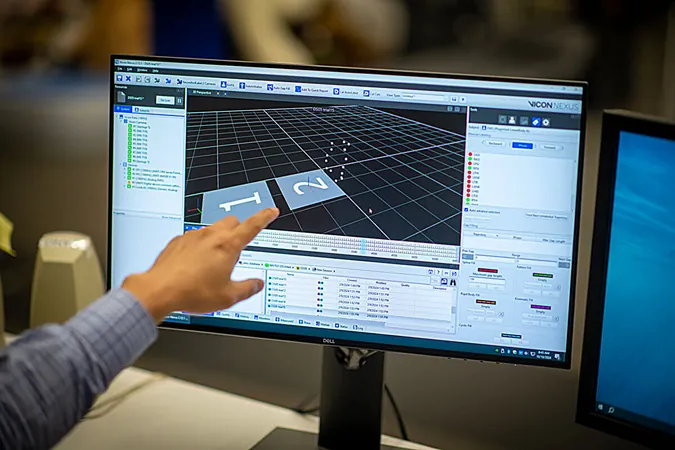
Unlocking Potential: How Motion Studies Could Transform Lives for Infants with Down Syndrome
2024-10-26
Author: Rajesh
Unlocking Potential: How Motion Studies Could Transform Lives for Infants with Down Syndrome
Babies with Down syndrome often face delays in reaching crucial motor milestones, but groundbreaking research led by Dr. Jerry Wu, a professor of kinesiology at Georgia State University, aims to change that narrative. For over two decades, Wu has dedicated himself to exploring interventions that could significantly enhance mobility, communication, and overall quality of life for these children.
Currently, Wu's team is engaging with over 40 families in the Atlanta metro area, working to provide opportunities for these infants to explore their surroundings and engage with others. "Our objective is to see how boosting their ability to move might also advance their cognitive and language skills," Wu explains.
According to the Centers for Disease Control and Prevention (CDC), an estimated 5,700 babies in the U.S. are born with Down syndrome each year. Wu's research includes two innovative studies that equip parents with practical tools and strategies to foster their child's development at home.
These studies delve into the interplay between motor skills and other developmental areas. Preliminary findings are expected next summer, shedding light on critical questions about early intervention. "We know from previous research that early intervention yields positive results in different developmental domains," Wu notes, but the connections between those domains remain underexplored.
Historically, most studies focused on predominantly white infants, leaving a critical gap in understanding how interventions affect diverse populations. Wu emphasizes the need to broaden research, especially in light of rapid advancements in scientific methodologies.
The current study employs two innovative approaches: "sticky mittens" training and bodyweight-supported treadmill stepping. The first allows infants to learn reaching and grasping through specially designed mittens, potentially aiding their early communication skills. Simultaneously, treadmill training aims to enhance motor skills and mobility. Parents are crucial participants, implementing these techniques in daily practice to optimize their child's development.
"It's essential that parents are involved. Their commitment is indispensable to the success of our training programs," Wu states. Families have been overwhelmingly supportive, with some traveling from out of state for participation.
The research team also includes experts from psychology and physical therapy, underscoring the importance of an interdisciplinary approach. Wu believes that integrating insights from various fields will provide a comprehensive understanding of child development.
Interestingly, elements like posture and babbling sounds play a significant role in their research. "Babbling is a foundation for speech development, and rhythmic arm movements correlate with it in typically developing children," Wu explains. By examining these connections in infants with Down syndrome, the team hopes to uncover new strategies for early interventions.
In another exciting venture, Wu's team is harnessing artificial intelligence for data analysis. By using computer vision software on recorded videos of infants during play, they will extract key movement patterns and gain deeper insights into the developmental process. This innovative approach promises to streamline the research process while uncovering valuable correlations between motor movements and language emergence.
While early results indicate that infants improve their motor patterns and develop more efficient arm movements through these interventions, Wu remains focused on future research directions. "Our next steps involve disseminating our findings to parents, clinicians, and researchers worldwide," he affirms. The ultimate goal? To enhance the quality of life for individuals with Down syndrome and their families.
In a world where understanding and support for developmental disabilities is crucial, Wu's research represents a beacon of hope, highlighting that targeted interventions can indeed "move the needle" for infants with Down syndrome.



 Brasil (PT)
Brasil (PT)
 Canada (EN)
Canada (EN)
 Chile (ES)
Chile (ES)
 España (ES)
España (ES)
 France (FR)
France (FR)
 Hong Kong (EN)
Hong Kong (EN)
 Italia (IT)
Italia (IT)
 日本 (JA)
日本 (JA)
 Magyarország (HU)
Magyarország (HU)
 Norge (NO)
Norge (NO)
 Polska (PL)
Polska (PL)
 Schweiz (DE)
Schweiz (DE)
 Singapore (EN)
Singapore (EN)
 Sverige (SV)
Sverige (SV)
 Suomi (FI)
Suomi (FI)
 Türkiye (TR)
Türkiye (TR)